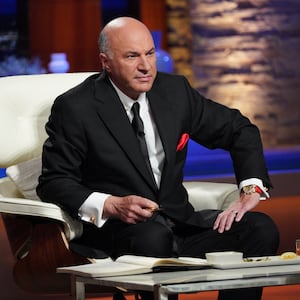After days of dodging, disgraced FTX founder Sam Bankman-Fried agreed Friday to testify before the House Financial Services Committee about the collapse of his cryptocurrency exchange.
Bankman-Fried, 30, has given nearly a dozen media interviews since the implosion and bankruptcy of his company—repeatedly apologizing for the approximately $8 billion in lost user funds while insisting he had no idea how bad the situation had gotten.
In between mea culpas, he resisted calls for him to testify before Congress, claiming he did not have enough information to speak. But on Friday, he finally bowed to demands from committee chair Rep. Maxine Waters, announcing in a tweet that he is willing to testify at a hearing on Dec. 13. His acquiescence comes with a big caveat: He said there is a “limit to what I will be able to say, and I won't be as helpful as I'd like.”

Andrew Ross Sorkin and Sam Bankman-Fried on stage at the 2022 New York Times DealBook Summit on Nov. 30.
Thos Robinson/GettyExperts told The Daily Beast there is plenty Bankman-Fried can—and should—offer up under oath. Here are some questions they think he should face during the grilling.
Did he knowingly misuse customer funds?
The answer shouldn’t require more than a simple “yes” or “no,” though in some interviews Bankman-Fried has appeared to deflect. In one particularly brutal example, he struggled to explain to Good Morning America’s George Stephanopoulos why customer deposits may have been loaned to other entities he was affiliated with— namely the trading firm Alameda Research—in apparent violation of FTX’s terms and conditions. In multiple interviews, Bankman-Fried has claimed ignorance about Alameda’s loan structures and the amount of risk FTX had taken on, saying he was focused on other areas of the business.
But experts who spoke to The Daily Beast said that defense holds little water. “It's as though you came to me as a professor and said, ‘Hey, gosh, why did you let all that cheating happen in your class?’ And I'm like, ‘Listen, I was just focused on teaching the students,’” said Joseph Wall, a professor at Marquette University who researches fraudulent behavior in disruptive technologies. “Both things can be true, but it doesn't abdicate my responsibility to catch the cheating and grade properly.”
The stakes for SBF are enormously high, as he weighs trying to salvage his reputation against exposing himself to legal peril. John C. Coffee, a professor at Columbia Law School, emphasized that lying during his testimony “could produce a perjury indictment.”
Why didn’t he set up better firewalls against conflicts of interest?
After FTX’s abrupt collapse, Bankman-Fried was pushed out as CEO, and a new executive, John Jay Ray III, took the helm. Ray immediately assailed the old leadership team in a Nov. 17 bankruptcy filing, writing, “Never in my career have I seen such a complete failure of corporate controls and such a complete absence of trustworthy financial information as occurred here.”
Considering the financial entanglement between the FTX exchange and Alameda Research, there should have been clear safeguards in place to prevent abuse, said Ranjay Gulati, a professor at Harvard Business School. “Whenever you have businesses that are transacting with each other, and that are supposedly independent, you have to create checks and balances,” he said.
Brian Green, professor of accounting at the University of Michigan-Dearborn, said there are also unanswered questions about FTX’s auditors, including how they valued FTX’s tokens. “How can a CPA firm test the fair value of a made-up asset?” he asked. Green also expressed interest in how FTX selected its auditing firm, how much time was spent examining its books, and whether the auditing firm was equipped to handle such a large project.
Was he actively trying to thwart regulation?
In an interview with Vox, which Bankman-Fried later claimed he didn’t know was on the record, he blasted D.C. bureaucrats he had once courted. “Fuck regulators,” he said. After the article was published, Bankman-Fried tried to walk back his outburst, declaring on Twitter that “it's *really* hard to be a regulator. They have an impossible job: to regulate entire industries that grow faster than their mandate allows them to.” Congress members may be interested to know whether SBF was just yanking their chain when he previously testified on Capitol Hill and lobbied behind closed doors.
What happened to the missing funds?
Bankman-Fried, once worth more than $26 billion, now claims he is down to a single credit card and about $100,000 in the bank. Left for Congress and law enforcement to unpack: Where did all of the money go? Wall suggested that committee members examine Bankman-Fried’s digital wallets in the U.S. to investigate where he transferred funds and whether company assets were improperly shifted. Some of that information, he noted, could be subpoenaed by committee members if he refuses to comply.
Did he associate with powerful figures to shield FTX from scrutiny?
FTX doled out millions to public figures to boost its reputation and visibility. Last month, many of those celebs—including Tom Brady, Naomi Osaka, Gisele Bündchen, and Shark Tank judge Kevin O’Leary— were named in a lawsuit seeking class-action status in Miami District Court. The suit alleges that FTX leveraged their star power “to raise funds and drive American consumers to invest,” which resulted in investors “pouring billions of dollars into the [d]eceptive FTX Platform to keep the whole scheme afloat.” O’Leary has emerged looking especially sloppy; he signed on as an FTX ambassador in 2021 as part of a $15 million deal and declared that the exchange had satisfied his “rigorous standards of compliance.” O’Leary acknowledged this week that he and other investors “all look like idiots.”
Bankman-Fried also generated clout by mingling with political luminaries like Bill Clinton and branding himself as a Democratic mega-donor. He once promised to spend as much as $1 billion on political races through the 2024 election, a pledge he later walked back. SBF claimed in recent interviews that he secretly donated to Republicans as well. The entrepreneur has denied trying to “buy influence” from politicians and media companies, but questions remain about what he wanted to do with all those donations and deals.
When did he first catch on to problems?
Bankman-Fried told The New York Times on Nov. 30 that he only grasped the scale of FTX’s problems on Nov. 6. At that point, the industry publication CoinDesk had already published an article questioning FTX’s balance sheet and pointing out that its arrangement with Alameda was “unusually close.” Bankman-Fried will now need to address this timeline under oath, and it may be difficult to insist he knew little of Alameda’s operations. Forbes reported this month that Bankman-Fried had sent the outlet detailed information about the businesses several times for the purpose of estimating his net worth.
Does he accept total responsibility?
“I was CEO. I was the CEO of FTX. And I say this again and again that it means I had a responsibility,” Bankman-Fried told The New York Times. Still, he has at times seemed to cast blame on Alameda’s leadership team and other executives who purportedly may have known more details about the company’s leverage.
Gulati said that Bankman-Fried may be setting up a defense mirroring that of Theranos founder Elizabeth Holmes, who sought to pin much of the blame for the blood-testing startup’s demise on her former romantic partner and chief operating officer Sunny Balwani. (They both were convicted).
“Typically in a fraud, where there are two people colluding, even if they aren't purposely doing so, they point the finger at each other,” Wall said.
If Bankman-Fried doesn’t answer this question before Congress, he still may have to do so in court.









